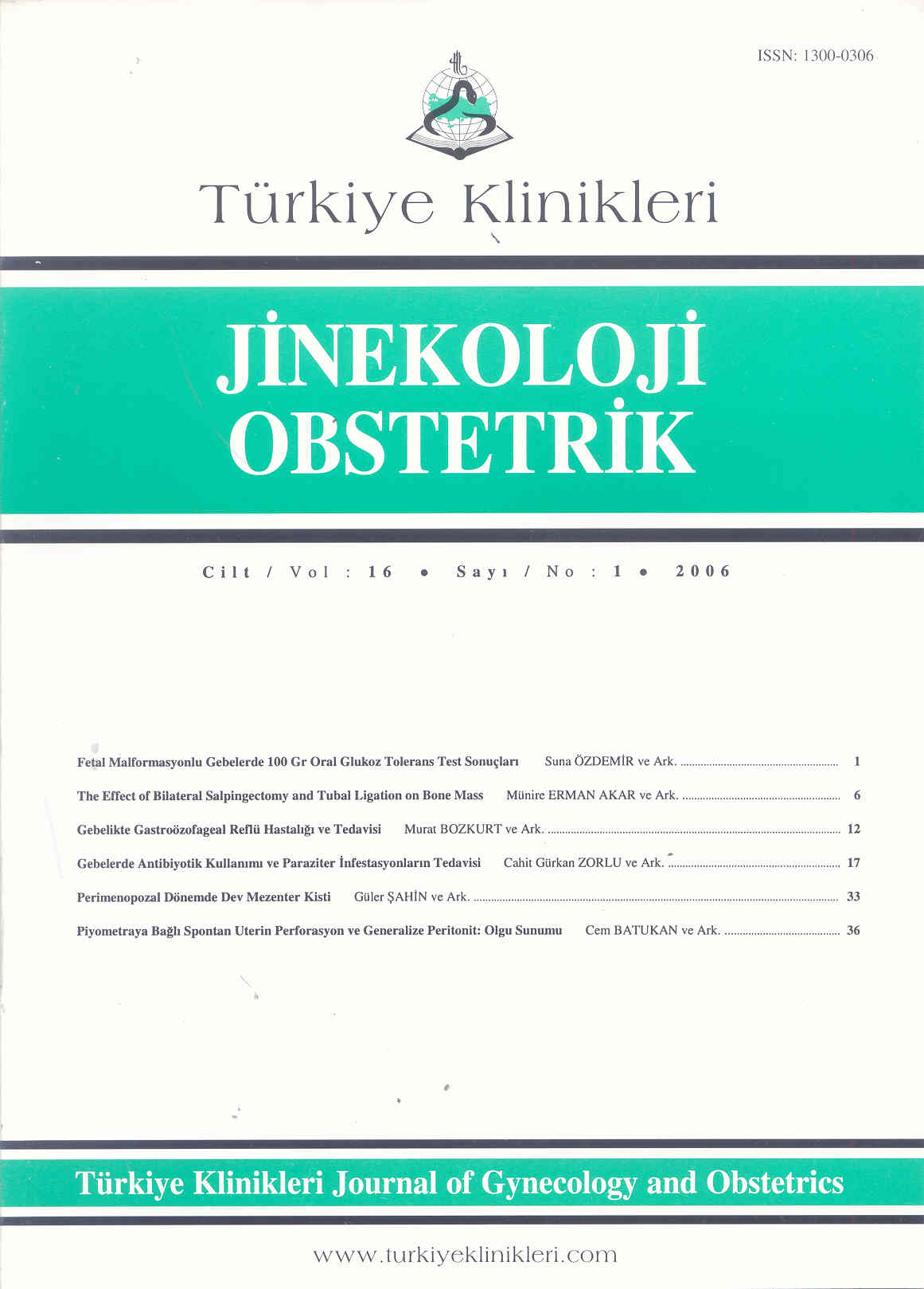Open Access
Peer Reviewed
REVIEW
3729 Viewed3744 Downloaded
Use Of Antibiotics And Treatment Of Parasitic Infestations In Pregnancy
Gebelerde Antibiyotik Kullanımı ve Paraziter İnfestasyonların Tedavisi
Turkiye Klinikleri J Gynecol Obst. 2006;16(1):17-32
Article Language: TR
Copyright Ⓒ 2025 by Türkiye Klinikleri. This is an open access article under the CC BY-NC-ND license (http://creativecommons.org/licenses/by-nc-nd/4.0/)
ÖZET
Gebelikte antibakteriyel ve antiparaziter tedaviye birkaç açıdan yaklaşılmalıdır. Öncelikle, gebelikte fizyolojik değişiklikler dolayısı ile, bazı ajanların farmakokinetiği değişebilir. Bu nedenle gebelere ilaç verirken dozajı tekrar gözden geçirmek gerekebilir. Bunun yanında, fetusun ilaçlara yanıtı anneninkinden farklı olabilir. Gebelere verilen tüm ilaçların, farklı oranlarda da olsa, fetusa geçtiği kabul edilir. İlacın fetusta yaratabileceği olumsuz etkiler sorgulandığında ilacın gebeliğin kaçıncı trimesterinde kullanıldığı da önem taşır. İlk trimesterde özellikle mutajenik ve teratojenik etki gösteren ajanlardan kaçınılır. Son trimesterde fetusun metabolizması üzerine etki ederek neonatal sorunlara yol açabilecek ilaçlar bilinmelidir. Bu derlemede, gebelikte gerektiğinde doğru anti-enfektif ajana başvurmamızı ve fayda-zarar analizi yapmamızı kolaylaştırmak üzere, gebeliğe özgü değişikliklere ve gebelikte antibiyotik kullanımının ana prensiplerine değinilmiş ve günümüzde sık kullanılan anti-enfektif ajanlar tek tek irdelenmiştir. Laktasyonda ilaç kullanımından da kısaca bahsedilmiştir.
Gebelikte antibakteriyel ve antiparaziter tedaviye birkaç açıdan yaklaşılmalıdır. Öncelikle, gebelikte fizyolojik değişiklikler dolayısı ile, bazı ajanların farmakokinetiği değişebilir. Bu nedenle gebelere ilaç verirken dozajı tekrar gözden geçirmek gerekebilir. Bunun yanında, fetusun ilaçlara yanıtı anneninkinden farklı olabilir. Gebelere verilen tüm ilaçların, farklı oranlarda da olsa, fetusa geçtiği kabul edilir. İlacın fetusta yaratabileceği olumsuz etkiler sorgulandığında ilacın gebeliğin kaçıncı trimesterinde kullanıldığı da önem taşır. İlk trimesterde özellikle mutajenik ve teratojenik etki gösteren ajanlardan kaçınılır. Son trimesterde fetusun metabolizması üzerine etki ederek neonatal sorunlara yol açabilecek ilaçlar bilinmelidir. Bu derlemede, gebelikte gerektiğinde doğru anti-enfektif ajana başvurmamızı ve fayda-zarar analizi yapmamızı kolaylaştırmak üzere, gebeliğe özgü değişikliklere ve gebelikte antibiyotik kullanımının ana prensiplerine değinilmiş ve günümüzde sık kullanılan anti-enfektif ajanlar tek tek irdelenmiştir. Laktasyonda ilaç kullanımından da kısaca bahsedilmiştir.
ANAHTAR KELİMELER: Gebelik, antibiyotik, enfeksiyon, parazit
ABSTRACT
There are several aspects of antibacterial and antiparasitic therapy in pregnancy. First of all, due to the physiologic changes in pregnancy, the pharmacokinetics of some agents may change. That is why the dosage may need a rearrangement when prescribing the pregnant patient. Besides, the reaction of the fetus to some drugs may differ from that of the mother's. All the medications given to the pregnant woman are assumed to be transferred to the fetus in varying ratios. When the adverse effects of the drugs are investigated, it is important to question the period of gestation it is used. Agents with teratogenic and mutagenic effects are avoided especially within the first trimester. In the last trimester, the drugs that may cause neonatal problems by acting on the metabolism of the fetus should be known. In this review, in order to help us utilize the right anti-infective agent and do a risk-benefit analysis, the pregnancy-related changes and general principles of antibiotic use in pregnancy have been summarized. The most frequently preferred anti-infective agents are mentioned and antibiotic use during lactation is shortly discussed.
There are several aspects of antibacterial and antiparasitic therapy in pregnancy. First of all, due to the physiologic changes in pregnancy, the pharmacokinetics of some agents may change. That is why the dosage may need a rearrangement when prescribing the pregnant patient. Besides, the reaction of the fetus to some drugs may differ from that of the mother's. All the medications given to the pregnant woman are assumed to be transferred to the fetus in varying ratios. When the adverse effects of the drugs are investigated, it is important to question the period of gestation it is used. Agents with teratogenic and mutagenic effects are avoided especially within the first trimester. In the last trimester, the drugs that may cause neonatal problems by acting on the metabolism of the fetus should be known. In this review, in order to help us utilize the right anti-infective agent and do a risk-benefit analysis, the pregnancy-related changes and general principles of antibiotic use in pregnancy have been summarized. The most frequently preferred anti-infective agents are mentioned and antibiotic use during lactation is shortly discussed.
MENU
POPULAR ARTICLES
MOST DOWNLOADED ARTICLES





This journal is licensed under a Creative Commons Attribution-NonCommercial-NoDerivatives 4.0 International License.










